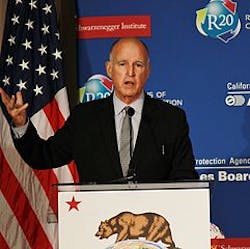Calif. Governor addresses long-term, emergency water conservation
Source: ACWA
CALIFORNIA, May 11, 2016 -- Gov. Jerry Brown issued an executive order that outlines longer-term water conservation measures aimed at achieving a top priority in the California Water Action Plan -- making conservation a way of life.
The executive order was issued in conjunction with a State Water Resources Control Board staff proposal to modify the existing emergency water conservation regulation to reflect improved conditions and allow for more local decision making. The staff proposal would replace the existing mandatory conservation tiers with targets based on local supply and conditions.
In a joint press call, the Brown Administration and the State Water Board provided details on the executive order and the proposed changes to the state’s emergency conservation regulation. Proposed changes to the emergency regulation would require local urban water agencies to self-assess their water supply conditions -- looking ahead three years -- and set conservation targets based on those conditions and average customer demand during 2013 and 2014.
If approved by the board at its May 18 meeting, the amended emergency conservation regulation would take effect June 1 and remain in effect until the end of January 2017.
Brown’s executive order keeps in place such conservation measures as permanent monthly water use reporting by water agencies and makes permanent bans on practices such as hosing off sidewalks, driveways and others hardscapes.
“Californians stepped up during this drought and saved more water than ever before,” Brown said in a press release. “But now we know that drought is becoming a regular occurrence and water conservation must be a part of our everyday life.”
In a call with reporters, State Water Board Chair Felicia Marcus said that winter rains have provided somewhat of a “reprieve” to drought conditions in some parts of the state. To reflect these less severe conditions, and to acknowledge varying water supplies throughout California, State Water Board staff is proposing altering the current emergency water conservation regulation to make it less of a "blunt instrument," said Marcus.
Under the staff proposal, local agencies would self-assess their water supplies to ensure they have enough water for three years of drought conditions. If they cannot meet those three years of supply, the agencies would set their own conservation target based on the percentage they estimate they would be lacking in water supply.
Local water agencies would be required to file their supply assessments and targets with the state. The state would then monitor to see that those targets are met.
“They get more local control, and we get more transparency,” said Marcus.
About ACWA
The Association of California Water Agencies (ACWA) is the largest statewide coalition of public water agencies in the country. Its 430 public agency members collectively are responsible for 90% of the water delivered to cities, farms and businesses in California.
